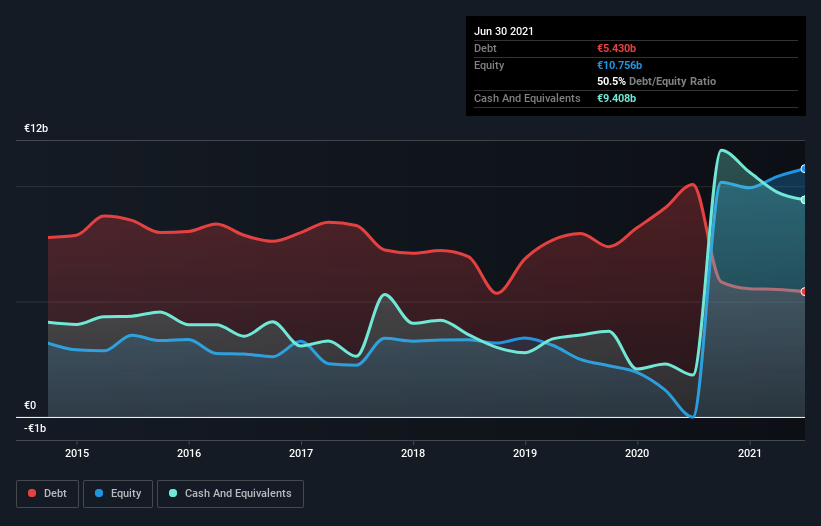
The external fund manager backed by Berkshire Hathaway's Charlie Munger, Li Lu, makes no bones about it when he says 'The biggest investment risk is not the volatility of prices, but whether you will suffer a permanent loss of capital.' When we think about how risky a company is, we always like to look at its use of debt, since debt overload can lead to ruin. As with many other companies thyssenkrupp AG (ETR:TKA) makes use of debt. But is this debt a concern to shareholders?
What Risk Does Debt Bring?
Debt assists a business until the business has trouble paying it off, either with new capital or with free cash flow. Ultimately, if the company can't fulfill its legal obligations to repay debt, shareholders could walk away with nothing. However, a more frequent (but still costly) occurrence is where a company must issue shares at bargain-basement prices, permanently diluting shareholders, just to shore up its balance sheet. Of course, plenty of companies use debt to fund growth, without any negative consequences. The first thing to do when considering how much debt a business uses is to look at its cash and debt together.
See our latest analysis for thyssenkrupp
What Is thyssenkrupp's Debt?
You can click the graphic below for the historical numbers, but it shows that thyssenkrupp had €5.43b of debt in June 2021, down from €10.1b, one year before. However, it does have €9.41b in cash offsetting this, leading to net cash of €3.98b.

How Strong Is thyssenkrupp's Balance Sheet?
The latest balance sheet data shows that thyssenkrupp had liabilities of €12.9b due within a year, and liabilities of €12.9b falling due after that. Offsetting this, it had €9.41b in cash and €7.20b in receivables that were due within 12 months. So it has liabilities totalling €9.20b more than its cash and near-term receivables, combined.
The deficiency here weighs heavily on the €5.71b company itself, as if a child were struggling under the weight of an enormous back-pack full of books, his sports gear, and a trumpet. So we'd watch its balance sheet closely, without a doubt. At the end of the day, thyssenkrupp would probably need a major re-capitalization if its creditors were to demand repayment. thyssenkrupp boasts net cash, so it's fair to say it does not have a heavy debt load, even if it does have very significant liabilities, in total. The balance sheet is clearly the area to focus on when you are analysing debt. But ultimately the future profitability of the business will decide if thyssenkrupp can strengthen its balance sheet over time. So if you want to see what the professionals think, you might find this free report on analyst profit forecasts to be interesting.
In the last year thyssenkrupp wasn't profitable at an EBIT level, but managed to grow its revenue by 4.9%, to €32b. We usually like to see faster growth from unprofitable companies, but each to their own.
So How Risky Is thyssenkrupp?
By their very nature companies that are losing money are more risky than those with a long history of profitability. And we do note that thyssenkrupp had an earnings before interest and tax (EBIT) loss, over the last year. And over the same period it saw negative free cash outflow of €2.4b and booked a €3.8b accounting loss. But at least it has €3.98b on the balance sheet to spend on growth, near-term. Overall, we'd say the stock is a bit risky, and we're usually very cautious until we see positive free cash flow. When we look at a riskier company, we like to check how their profits (or losses) are trending over time. Today, we're providing readers this interactive graph showing how thyssenkrupp's profit, revenue, and operating cashflow have changed over the last few years.
If, after all that, you're more interested in a fast growing company with a rock-solid balance sheet, then check out our list of net cash growth stocks without delay.
If you’re looking to trade thyssenkrupp, open an account with the lowest-cost* platform trusted by professionals, Interactive Brokers. Their clients from over 200 countries and territories trade stocks, options, futures, forex, bonds and funds worldwide from a single integrated account. Promoted
If you're looking to trade thyssenkrupp, open an account with the lowest-cost platform trusted by professionals, Interactive Brokers.
With clients in over 200 countries and territories, and access to 160 markets, IBKR lets you trade stocks, options, futures, forex, bonds and funds from a single integrated account.
Enjoy no hidden fees, no account minimums, and FX conversion rates as low as 0.03%, far better than what most brokers offer.
Sponsored ContentNew: Manage All Your Stock Portfolios in One Place
We've created the ultimate portfolio companion for stock investors, and it's free.
• Connect an unlimited number of Portfolios and see your total in one currency
• Be alerted to new Warning Signs or Risks via email or mobile
• Track the Fair Value of your stocks
This article by Simply Wall St is general in nature. We provide commentary based on historical data and analyst forecasts only using an unbiased methodology and our articles are not intended to be financial advice. It does not constitute a recommendation to buy or sell any stock, and does not take account of your objectives, or your financial situation. We aim to bring you long-term focused analysis driven by fundamental data. Note that our analysis may not factor in the latest price-sensitive company announcements or qualitative material. Simply Wall St has no position in any stocks mentioned.
*Interactive Brokers Rated Lowest Cost Broker by StockBrokers.com Annual Online Review 2020
Have feedback on this article? Concerned about the content? Get in touch with us directly. Alternatively, email editorial-team (at) simplywallst.com.
About XTRA:TKA
thyssenkrupp
Operates as an industrial and technology company in Germany and internationally.
Flawless balance sheet and undervalued.
Similar Companies
Market Insights
Community Narratives



